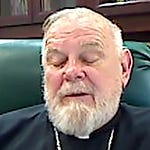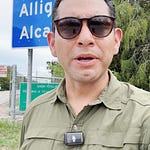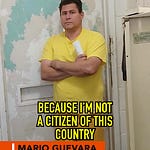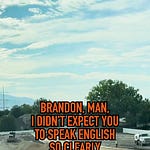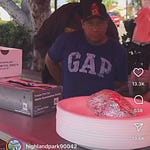The detention of Spanish language journalist Mario Guevara is not just about one man’s confinement, but about what it means when truth itself is punished. We spent the evening with Guevara’s children who believe their father was wrongfully arrested for exposing ICE raids.
By Nick Valencia | September 3, 2025
LILBURN, GEORGIA — At first, the Guevaras thought Mario would be home in days. The charges were minor: jaywalking, unlawful assembly, obstruction.
But since his arrest during a "No Kings Protest" on June 14, the journalist has now spent 81 days in immigration custody making him one of the longest detained journalists in U.S. history.
On an warm summer evening outside of Atlanta, his family invited to me to their home to speak about what it means to live without him, and why his absence has left not just his family, but an entire community adrift.
The Shell Game
When bond was initially granted again on July 1, the family rushed to pay.
"The local charges were dropped. He no longer had anything pending. But he still wasn’t free," his daughter Katherine Guevara, 27, told me while sitting at the family's dinner table.
That's when they found out he was put on an ICE hold.
"Neither online nor in person would they accept payment [for bond],” his daughter said about his ICE detainer.
In the 81 days since, Mario has been moved five times.
His daughter Katherine believes the chaos is deliberate.
“They do these things purposefully — to frustrate you, to break you, so you just sign the deportation papers. ICE officers have told my dad, ‘You’re going to be here a while. Just sign.’ But he tells them, ‘I’m a patient man.’”
Extorted Behind Bars
For a time, Mario was housed in an Atlanta federal facility. Because of overcrowding, some ICE detainees including Mario were placed in general population. There, men with misdemeanors were mixed with men convicted of violent crimes. That’s where a prison gang extorted him.
“Other detainees were gathering around him because they recognized him,” his daughter Katherine explained to us. “They saw him as famous. That’s what made him a target.”
The first sign of extortion was a photo texted to his daughter from an unknown number: Mario sitting on his bed in his cell.
“At first I thought it was AI,” she said. Then came the demand: “$60 per day.”
Mario called soon after. “If you don’t send the money, they’re going to hurt me.” Twice the family wired payments. Each time, the demands escalated.
Attorneys intervened and he was transferred the next day.
Now where he is at Folkston--five hours away from his family--he has been held mostly in isolation. But when his legal team filed a habeas petition citing those conditions, guards suddenly tried to move him back into general population.
“He refused,” his daughter said. “After what he went through, he wasn’t going back.”
Every day brings new anxieties — transfers, threats, silence. “It creates so much anxiety,” his daughter said. “Every day it’s something new. And then we’re expected to just keep going, live our lives, stick to our routines. It’s been horrible.”
Anchored By Faith
Mario Guevara’s absence has reshaped Atlanta’s Latino community.
"People say ever since he was taken into custody, there are no more ICE raids,” his daughter told me. “But that’s not true. They’re just not being exposed. He was way more than a journalist. He was a figurehead.”
In the Guevara household, faith and outrage sit side by side with his children. They are angry, yes. But they are mostly resolute and growing up faster than they may want to. Mario’s eldest son, 21-year-old Oscar, has stepped into his father’s shoes. A brain surgery survivor, he now runs the family business while also carrying the emotional load.
“God has made me an emotionally intelligent and mature person,” he said. “I keep everything inside, bottled up, and that’s how I can help my family. But there are times where I just can’t take it anymore, and I cry — but away from them.”
The hardest part, he admitted, is watching his sister break down.
“She’s my best friend. And seeing her like that is hard, especially when it’s because of our dad. It’s tough. But as the oldest male after my dad, the family naturally looks to me for comfort. So I have to be strong.”
The Guevaras live each day in a cycle of dread and determination, knowing that tomorrow may bring yet another setback — or the miracle of release. And through it all, they insist: silencing one reporter will never silence the truth.
Nick Valencia News is a reader-supported publication. To receive new posts and support my work, consider becoming a free or paid subscriber.





